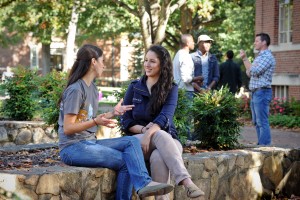Graduate Students, Professional Students, and Postdoctoral Scholars
Teaching as a Graduate Student

Graduate Students, Professional Students, and Postdoctoral Scholars make important contributions to the teaching and research excellence at Carolina. Oftentimes, this requires juggling different roles and tasks such as developing rapport with students, overcoming public speaking anxieties, balancing flexibility and authority, developing a strong command of the material, and advancing one’s role in the field through networking and scholarly contributions.
Create your Individual Development Plan
One critical element of an effective mentor-mentee relationship is a shared understanding of what each person expects from the relationship. Frustration for both the mentor and mentee can arise from misunderstandings about expectations. Importantly, expectations change over time so frequent reflection and clear communication are needed to maintain a collaborative relationship. Completing an expectations worksheet together is a helpful strategy for aligning relationship expectations.
Align Expectations in Your Mentoring Relationship
Even the most excellent faculty mentor will not be able to meet all of your academic and professional needs. Identifying a developmental network of individuals to support your professional and personal growth during your graduate school training and beyond will set you up for a successful and fulfilling career. As you complete the University of Michigan’s Graduate Student Mentoring Map exercise, think broadly and inclusively about all of the people who can support your academic, professional, and personal goals. Some of these individuals may be mentors, while others may be role models, advisors, peer colleagues, or family and friends. Reflect on what kind of training and skills you need and assess whether you have all of the people you need in your network. Revisit the map on a periodic basis, update it as your network grows, and identify gaps that you may need to fill.
Analyze Your Developmental Mentoring Network
Most of the Teaching and Learning workshops and programs that the CFE offers, like the Course Design Institute or the Equity in Teaching Institute, are open to graduate students and postdoctoral instructors. You might even consider inviting your advisor to attend with you in order to stoke conversations about teaching and learning.
Another career development resource for graduate students, and one the CFE partners with, is the Center for the Integration of Research, Teaching and Learning, or CIRTL. CIRTL specializes in early professional development for future faculty with goals of increasing the quality of undergraduate education and improving the competitiveness of graduate students on the job market.
Mentoring
Teaching and Learning
Student Safety, Health, and Well-Being
To learn more about Graduate Student, Professional Student, and Postdoctoral Scholar Programming, please contact cfe@unc.edu.




